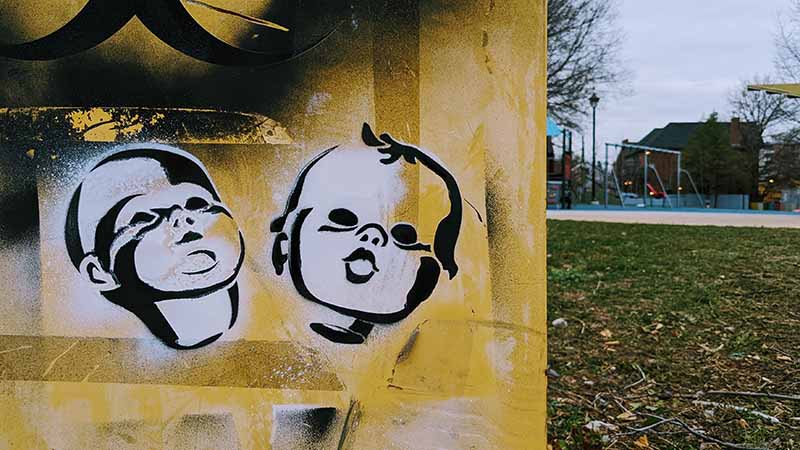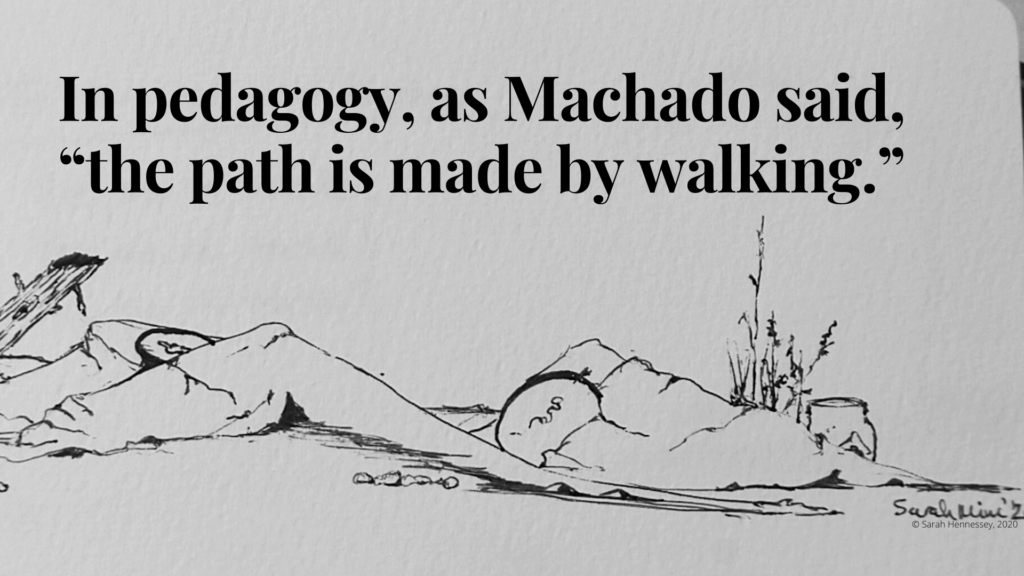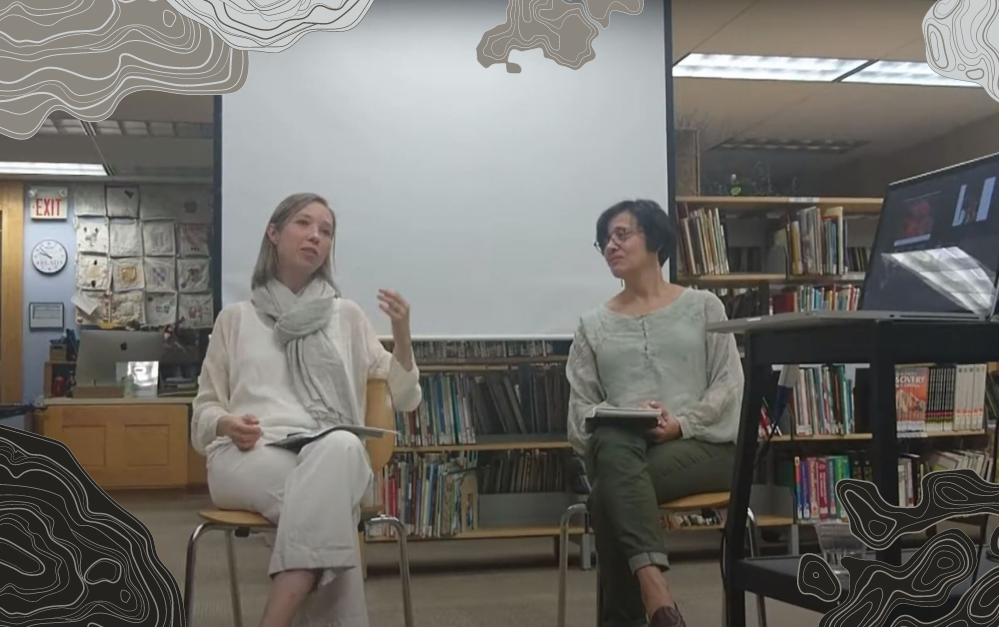Lindsay Sparkes (RECE) is Pedagogist with the Pedagogist Network of Ontario at London Bridge Childcare Services.
Across the world there are stories about waste problems, calling humans to take drastic action by recycling, reusing and reducing waste. However, many of these actions don’t solve the problems, they simply create new ones. In early childhood education, we have a tendency to find quick fix solutions to these challenges that make us feel like good citizens or stewards of the earth. These include recycling with children, banning of single use plastics, engaging in repurposing activities, and so on.
As a pedagogist implicated in this work for the past 5 years, I have been wondering how I might challenge some of these managerial approaches to the current climate crisis: What if, instead of quickly finding solutions, we rethink our response(abilities) to the growing waste crisis? With educators and children, and researchers in the Climate Action Childhood Network, I am engaged with this question. Using common worlds pedagogies (e.g., Blyth & Meiring, 2018; Iorio, Coustley, & Grayland, 2017; Lakind & Adsit-Morris, 2018; Nxumalo, 2016; Pacini-Ketchabaw & Nxumalo, 2015; Taylor, 2013, 2014, 2017; Taylor & Giugni, 2012), we are shifting our responses to human-induced ecological instability. Rather than focusing our actions on the individual, we are attending to the collective and to interrelations between humans and nonhuman others. “Common worlding” is a process of attending to the actual messy, unequal, and imperfect worlds real children inherit and co-inhabit along with other human and non-human beings (Taylor, 2013;Taylor & Pacini-Ketchabaw, 2019). Thus, in a society that places waste out of sight and out of mind, our work calls us to bring waste in sight and in mind.
Last year, in collaboration with educators, we centered our work around food waste specifically. Peels, seeds, cores from various types of produce were brought into the classroom. Our pedagogical intention involved paying attention to food wastes’ many processes so that we might build a different kind of (non-consumptive) relations between children and food waste.
Food waste and rituals around caring for food waste became central to our work, calling children and educators to engage deeply with what they might not pay attention otherwise. What used to be tossed in the garbage was then something we had to care for and care with. We paid attention, not only to how children engaged with food waste but how food waste invited children to engage with it. We paid attention to how food waste disrupted and interrupted the daily movements of the classroom. For more information, please see Storying with plastic excess: Relations with plastic in early childhood education.
Pedagogical Possibilities
My role has been to think through pedagogical practices to create food waste pedagogies with educators and children. This work doesn’t happen by chance. It must be brought into existence and kept alive every day in the early childhood centre (Nxumalo, Vintimilla & Nelson, 2018) . It requires us to make careful, pedagogical decisions that bring children more intimately into the life of food waste produced in our kitchen.
Our common worlding waste pedagogies involve creating curricular processes with children that think of waste materials as in constant transformation and as transforming, both independently and interdependently with humans. As we create curriculum with children, we work with the dynamic movements, disorderings and transformations of waste. This means that when children work with waste materials, they attend to their movements, impermanence, relationalities, connections with other materials and so on. We also pay attention to the temporalities of food waste and how food waste is in relation with other beings and creatures.
Studying our documentation becomes an integral part of our work together. Using video and audio recordings, photos and written notes, we pay attention carefully to the moments that hold pedagogical significance. For us, these moments are ones that have the potential for bringing children closer in relation to food waste. Returning to our documentation helps us to decide how to move towards the creation of otherwise futures, and to challenge managerial relations to waste.
The Onion
Several pieces of food scraps are lying across the table. Leo picks up the root of an onion and places his finger inside. He then begins looking for more, placing each one on a finger. He turns to Claire and begins to laugh. “Look Claire, I put the onions on my fingers.” Claire joins him and finds more onion roots. Removing the pieces from his fingers, Leo begins to place them inside one another. “Claire, we need to match them.” Onion upon onion is stacked inside. “I’m making an onion Claire.”
We take up the idea of making an onion and ask ourselves, ‘what does it mean to make an onion?’ Offering Leo’s idea back to the children, we are not interested in simply the making of something but also in the pedagogical possibilities that exist when children think of waste as alive. Over several months the children and educators engage with the question of how to make an onion, staying with the problems that emerge. How many layers does an onion need? What are the different layers of the onion for? How do we keep the onion together? What happens when mold begins to form? These questions revive the tensions of waste’s liveliness and particularities of the onion. Day after day, we experiment with the onion texture, size and thickness of each layer in an effort to make the biggest onion. When mold forms between the layers, one child suggests that we need to make an onion with less layers. Negotiations and collaborations take place. Perhaps mold only forms when there are many layers of onion.
With different fabrics we experiment how children themselves might become onions. They wrap layers of onion fabric around their bodies, imagining what it feels like to be an onion.
“I don’t like eating onions, but I like being an onion”-Maria
“It feels tight to be an onion.”-Jason
“I need more layers. I need a purple layer and a yellow layer.”-Sarah
“Oh no, I’m getting moldy.”-Maria
“We need the crunchy onion skin”-Sarah
This is slow, careful work that calls us to listen and respond differently than teaching children about waste and instead, refigures children’s relationships with waste. By keeping food waste in sight and in mind, children are noticing changes – not because we are teaching them about these changes, but because we have created the conditions for them to live and notice them. Rather than seeing ourselves as separate from waste, this work brings us into relation with waste.
Living with Tensions
As food scraps live in our space, their transformations brings tensions and discomforts. Children talk about the smells and textures of the decomposing food scraps and we are confronted with various problems. We feel tension around the health and safety of working with molding food waste. Questions around contamination, exposure, and impact bubble up as we are unsure how to proceed. Do we protect children from it? Can we touch it? Is it bad for us? These become questions that also live in our encounters.
Mold and fruit flies become protagonists in our work as decomposing food provides life to others. We slow down and stay with these problems, as children share ideas of where the flies come from and how they got into our classroom. We use drawing to bring their stories to life and offer different materials that help us to think more closely with the world that is being created between the children and the other. Decomposing food invites children and educators to re-compose stories of waste.
“The bees(fruit flies) are here! They followed the black bananas”-John
“How are they here?”-Darius
“They came in through the door straws-the space between the door”-John
“They follow the smell of the black banana”-Joe
“All the bees fly to the black banana. These are the mommy bees and these are the baby bees.”-Darius
“The leader bee leads them to our classroom.”-John
It is by keeping waste in sight and in mind that our ideas of caring FOR waste become a caring WITH waste. Shifting this narrative, children attend to the circularity and importance of food waste and rethink care as a deeply relational process. We wonder about how to move with these ideas. Do we set traps to remove the fruit flies? Is it important for the children to know they are not bees? By listening to the stories that are being created between bananas peels, the children and the bugs we begin to see familiar narratives with waste being replaced with new ones. Tensions are important components in pedagogical work. We keep waste in sight and in mind as we pay attention to its transformation processes and embrace the smells, textures and decomposition processes that give life to both other living creatures as well as our curriculum.
Waste Management to Circularity of Waste
Although we engaged in unusual relations with food waste, we also worked through more familiar ways of rethinking waste management practices with young children. Composting and vermi-composting become important rituals in how we move through the day. Drawing on the work of Narda Nelson (with Yazbeck, Danis, Elliot, Wilson, Payjack, & Pickup, 2018), we thought about how we might reconceptualize pedagogies of care in order to care for food waste differently. As Nelson mentions, “putting them (pedagogies of care) into action, is messy, imperfect and sometimes difficult work” (p. 48). Rather than seeing ourselves as separate from, how does caring with food waste become part of our everyday relations in which, we as humans are very much entangled with the more than human world?
At the end of each week, the food scraps in the classroom are carefully gathered to bring to the outdoor compost bin – this becomes our response-ability. We take seriously this notion of caring with waste, not to create good stewards of the earth but to respond to waste’s presence. The children visit this compost bin regularly as they notice the changes and life that is taking place inside. The compost bin becomes another setting for world making. Bees, flies, spiders, mold, and other living things share this space. As the lid is lifted, bees frantically fly out and hover around the children and the compost bin. We wonder together where the bees come from and what they are doing inside.
“There’s too many bees.”-Cameron
“The bees live in the compost because it’s dirty.”-Emmanuel
“I think the peels are their home.” – Cindy
“The bees are checking on the food scraps”-Alex
We notice their quick movements around the compost bin.
“They do a zig zag everyday”-Alex
As a way to pay attention to bees and their relation to the compost bin, we engage in these ideas of zig zagging with children over several months, enacting zig zag stories as a way to bring visibility to the constant movement between the children, bees and food scraps and the relational process of collective life. The compost bin doesn’t become a way to manage waste but becomes an alternative way of being with waste.
Overall, this work calls us to think and live differently with ideas of waste and waste management with young children. It asks us to stay with the tensions of waste so that we may create a different narrative with children. Rather than seeing waste as a problem to solve, we create curricular processes with children so that children get closer to the constant transformation of waste materials. We think about processes that open up possibilities for other kinds of relations for children in which we don’t know what will emerge. It is by moving with our pedagogical intention that we are able to respond to moments of significance and create this common world together.
References
Blyth, C. & Meiring, R. (2018). A posthumanist approach to environmental education in South Africa: Implications for teacher, teacher development and teacher training programs. Teacher Development, 22(1), 105-122. doi: 10.1080/13664530.2017.1327883
Iorio, J. M., Coustley, A., & Grayland, C. (2017). Practicing pedagogical documentation: Teachers making more-than-human relationships and sense of place visible. In N. Yelland & D. Frantz Bentley (Eds.), Found in translation (pp. 148–170). Routledge.
Lakind, A., & Adsit-Morris, C. (2018). Future child: Pedagogy and the post-Anthropocene. Journal of Childhood Studies, 43(1), 30–43.
Nxumalo, F. (2016). Storying practices of witnessing: Refiguring quality in everyday pedagogical encounters. Contemporary Issues in Early Childhood, 17(1), 39–53. doi: 10.1177/1463949115627898
Nxumalo, F., Vintimilla, C. D., & Nelson, N. (2018). Pedagogical gatherings in early childhood education: Mapping interferences in emergent curriculum. Curriculum Inquiry, 48(4), 433–453.
Pacini-Ketchabaw, V., & MacAlpine, K. A. (2022). Queer synthetic curriculum for the Chthulucene: Common worlding waste pedagogies. Catalyst: Feminism, Theory, Technoscience, 8(1).
Pacini-Ketchabaw, V & MacAlpine, K.A. (2022) Storying with plastic excess: relations with plastic in early childhood education. Pedagogy, Culture & Society. doi: 10.1080/14681366.2022.2156582
Pacini-Ketchabaw, V., & Nxumalo, F. (2015). Unruly raccoons and troubled educators: Nature/culture divides in a childcare centre. Environmental Humanities, 7, 151–168.
Taylor, A. (2013). Reconfiguring the natures of childhood. Routledge.
Taylor, A. (2014). Situated and entangled childhoods: Imagining and materializing children’s common world relations. In M. Bloch, B. Swadener, & G. Cannella (Eds.), Reconceptualizing early childhood care & education (pp. 121–130). Peter Lang.
Taylor, A. (2017). Beyond stewardship: Common world pedagogies for the Anthropocene. Environmental Education Research, 23(10), 1448– 1461.
Taylor, A., & Giugni, M. (2012). Common worlds: Reconceptualising inclusion in early childhood communities. Contemporary Issues in Early Childhood, 13(2), 108–119.
Vintimilla C.D., Nxumalo, F., & Nelson, N. (2018). Pedagogical gatherings in early childhood education: Mapping interferences in emergent curriculum. Curriculum Inquiry, 48(4), 433-453.








